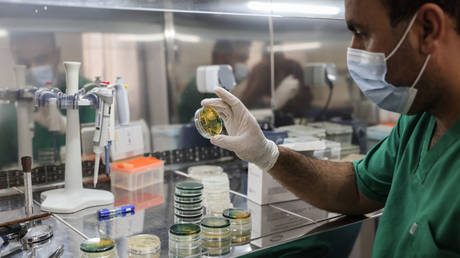
Disease is spreading throughout Syria, with thousands becoming infected, Caritas Germany warns
The number of cases and deaths from cholera in Syria is sharply rising as the outbreak has already infected thousands of people across the country, warns non-profit relief group Caritas International.
In a press release on Wednesday, the Germany-based organization said it was “extremely concerned” about the trend, noting that the outbreak was “very unusual in the Middle East and in Syria” and was a clear symptom of the “disastrous development” in the country.
“The poverty that has been growing for years and the poor hygienic conditions, in which refugees and displaced persons in particular have to live, are the breeding ground on which this typical disease of poverty is now spreading,” warned the head of the group’s Middle East Division, Christoph Klitsch-Ott.
According to Caritas, at least 13,059 people in Syria have been infected with the disease since the beginning of September, and over 60 people have officially died from the main symptoms of cholera – diarrhea and vomiting. It’s believed that polluted drinking water tanks and contaminated vegetables are the primary culprits behind the outbreak.
Caritas notes that the last 12 years of war in Syria have severely damaged the country’s sanitary infrastructure, as some 13 million people currently lack access to clean water and sanitary facilities. It’s noted that the situation is especially devastating in refugee camps, where people are forced to live in confined spaces and have limited access to safe water sources.
While the non-profit has made efforts to distribute clean drinking water and disinfectants in heavily affected areas of the country, it’s feared that the disease may continue to spread, not just within Syria but throughout the Middle East, according to Klitsch-Ott.
Last month, the World Health Organization also warned of cholera outbreaks in some 26 countries around the world, stating that the average fatality rate this year was three times higher compared to the five previous years.
The WHO’s team lead for cholera and epidemic diarrheal diseases, Philippe Barboza, called on countries to “act now” to prevent the disease from spreading even further, and to find ways to produce more cholera vaccines and expand access to antibiotics and clear water.
Cholera is an acute diarrheal illness caused by bacterial infection of the intestine. People tend to catch the disease when they swallow food or water contaminated with the cholera bacteria. The infection is believed to affect millions worldwide every year but, in most cases, the symptoms are mild or non-existent. However, if left untreated, the illness can quickly become life threatening, especially for the elderly as well as for people suffering from dehydration.




